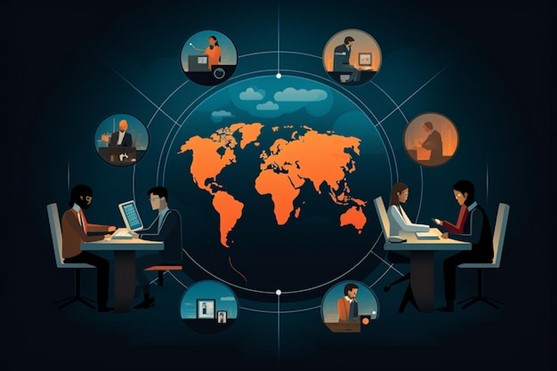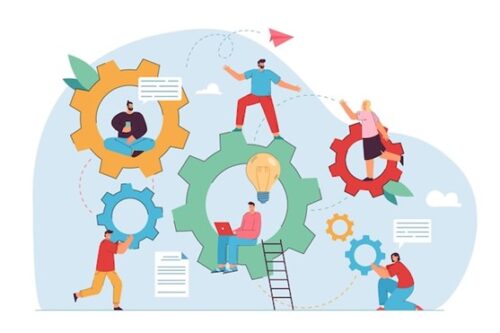Effective communication is a crucial skill that plays a vital role in both personal and professional relationships. It involves transmitting information, ideas, and emotions accurately and clearly to others. Mastering the art of effective communication can have a profound impact on various aspects of life, leading to improved understanding, stronger connections, and enhanced productivity. This article explores the importance of effective communication skills, the benefits it brings to personal and professional relationships, and how to improve these skills to unlock their full potential.Additionally, it delves into the influence of the Herrmann Brain Dominance Instrument (HBDI) in communication, techniques to improve communication skills, and the Thinkabout Communicating training program. Lastly, it highlights how effective communication fosters inclusivity and meaningful conversations, as well as its role in conflict resolution.
The Importance of Effective Communication Skills
Effective communication skills are essential in all areas of life. Whether it’s expressing your thoughts and feelings to loved ones, collaborating with colleagues at work, or even negotiating with business partners, the ability to communicate effectively can make or break a situation. Clear and concise communication helps to avoid misunderstandings, build trust, and foster better relationships.
In personal relationships, effective communication allows individuals to express their needs, emotions, and boundaries clearly. It facilitates understanding between partners, strengthens emotional connections, and resolves conflicts more effectively. Good communication also promotes active listening, empathy, and mutual respect, which are vital for healthy and long-lasting relationships.
In a professional setting, effective communication is equally crucial. It enables effective collaboration, boosts team morale, and increases productivity. Clear communication helps teams align their goals, share information efficiently, and work towards a common objective. It also enhances leadership skills, as effective leaders are adept at conveying their vision, providing feedback, and inspiring their team members to achieve their best.
Benefits of Effective Communication in Personal and Professional Relationships
Effective communication brings numerous benefits to personal and professional relationships. Firstly, it helps to establish trust and build stronger connections. When individuals communicate openly and honestly, they create an environment of trust, where others feel comfortable sharing their thoughts and feelings. This fosters deeper connections and builds stronger relationships based on mutual respect and understanding.
Secondly, effective communication minimizes misunderstandings and conflicts. Clear and concise communication reduces the chances of misinterpretation, as messages are delivered accurately and understood as intended. This reduces the potential for conflicts and helps resolve any existing issues more efficiently.
Furthermore, effective communication promotes active listening and empathy. When individuals communicate effectively, they actively listen to others, seeking to understand their perspective and emotions. This fosters empathy and allows for better problem-solving, as individuals can consider different viewpoints and find mutually beneficial solutions.
In a professional context, effective communication leads to improved productivity and efficiency. When teams communicate clearly and share information effectively, they can work together more cohesively towards a common goal. This reduces errors, minimizes delays, and ensures that everyone is on the same page, resulting in enhanced productivity and better outcomes.
Examples of Effective Communication in Different Settings
Effective communication can be observed in various settings and situations. For example, in personal relationships, it can be seen when a couple openly discusses their feelings and concerns, actively listens to each other, and finds mutually agreeable solutions to conflicts. Effective communication also manifests when parents communicate with their children, providing guidance, support, and understanding.
In a professional setting, effective communication is evident when team members collaborate seamlessly, sharing ideas, information, and feedback. It can be observed when leaders communicate their expectations clearly, motivate their team members, and foster an environment of open communication and trust.
Moreover, effective communication is vital in educational settings. Teachers who communicate effectively can engage their students, explain complex concepts clearly, and ensure that everyone understands the material. Similarly, students who communicate effectively with their peers and teachers can collaborate on projects, seek assistance when needed, and actively participate in discussions.
These examples illustrate how effective communication enhances relationships, improves understanding, and enables individuals to work together more efficiently towards shared goals.
The Impact of Effective Communication in the Workplace
Effective communication is particularly crucial in the workplace, where it has a direct impact on productivity, teamwork, and employee satisfaction. When employees communicate effectively, they can share ideas, provide feedback, and collaborate more efficiently, leading to improved outcomes. Additionally, effective communication promotes a positive work culture, where employees feel valued, heard, and motivated.
In a team setting, effective communication ensures that everyone understands their roles and responsibilities, reducing confusion and potential conflicts. It encourages open dialogue, where team members can freely express their ideas, concerns, and suggestions. This fosters a sense of belonging and empowerment, leading to increased job satisfaction and higher levels of engagement.
Furthermore, effective communication plays a crucial role in leadership. Effective leaders communicate their vision clearly to their team members, ensuring that everyone understands the goals and objectives. They provide constructive feedback, offer guidance, and inspire their team to perform at their best. This enables better decision-making, smoother workflow, and a more motivated and productive team.
Overall, effective communication in the workplace drives collaboration, enhances teamwork, and creates a positive and productive work environment.
Understanding the HBDI Influence in Communication
To further enhance communication skills, it is essential to understand the Herrmann Brain Dominance Instrument (HBDI). The HBDI is a tool that helps individuals gain insights into their thinking preferences and understand how they process information. It identifies four thinking styles, each associated with different brain quadrants, and provides a framework for better understanding individual strengths and areas for development.
The HBDI assessment measures an individual’s thinking preferences based on their responses to a series of questions. It generates a profile that highlights their preferences among four quadrants: analytical thinking, practical thinking, relational thinking, and experimental thinking. This profile serves as a guide to understanding how individuals approach problem-solving, decision-making, and communication.
By understanding their thinking preferences as revealed by the HBDI, individuals can adapt their communication style to effectively connect with others. For example, someone with a strong preference for analytical thinking may prefer logical and data-driven communication, while an individual with a preference for relational thinking may respond better to empathetic and relationship-focused communication.
Understanding the HBDI provides individuals with valuable insights into their own communication style and enables them to recognize and appreciate the diverse thinking styles of others. This fosters better understanding, empathy, and collaboration, ultimately leading to improved communication and stronger relationships.
Exploring the HBDI Assessment and Its Significance
The HBDI assessment is a valuable tool for individuals and organizations seeking to improve communication skills. By completing the HBDI assessment, individuals gain a comprehensive understanding of their thinking preferences and can leverage this knowledge to enhance their communication style.
The assessment consists of a series of questions that individuals answer based on their preferences and behaviors. The responses are then analyzed to generate a profile that reflects their thinking preferences across the four quadrants. This profile provides a visual representation of an individual’s thinking style, highlighting their strengths and areas for growth.
The significance of the HBDI assessment lies in its ability to uncover thinking patterns and preferences that may influence communication. For example, someone with a high preference for analytical thinking may have a more structured and logical communication style, while an individual with a preference for experimental thinking may be more open to taking risks and exploring new ideas.
By understanding their own thinking preferences and those of others, individuals can adjust their communication style to better connect with different audiences. This leads to improved understanding, reduced conflicts, and more effective communication overall.
Moreover, the HBDI assessment can be used within organizations to enhance team dynamics and improve communication within teams. By understanding the thinking preferences of team members, leaders can foster a collaborative environment where diverse perspectives are valued and communication is tailored to accommodate different thinking styles.
Unpacking the Four Thinking Styles of the HBDI
The HBDI identifies four thinking styles, each associated with different brain quadrants. These thinking styles provide insights into how individuals process information, solve problems, and communicate. Understanding these styles is crucial for adapting communication strategies to effectively engage with different thinking preferences.
- Analytical Thinking Style: Individuals with a preference for analytical thinking are logical, systematic, and detail-oriented. They excel at analyzing data, identifying patterns, and making informed decisions based on evidence. Their communication style tends to be structured, precise, and focused on facts and figures.
- Practical Thinking Style: Individuals with a preference for practical thinking are pragmatic, organized, and action-oriented. They value efficiency, results, and practical solutions. Their communication style is straightforward, goal-oriented, and focused on the practical implications of ideas.
- Relational Thinking Style: Individuals with a preference for relational thinking are empathetic, intuitive, and relationship-focused. They excel at understanding people’s emotions, motivations, and perspectives. Their communication style is warm, empathetic, and focused on building connections and fostering collaboration.
- Experimental Thinking Style: Individuals with a preference for experimental thinking are creative, innovative, and open to new ideas. They enjoy exploring possibilities, taking risks, and challenging the status quo. Their communication style is imaginative, open-minded, and focused on generating new insights and fostering creativity.
By understanding these thinking styles, individuals can adapt their communication approach to effectively engage with different audiences. Recognizing and appreciating the diverse thinking preferences of others leads to improved communication, stronger relationships, and more effective collaboration.
Applying the Concept of Whole Brain Thinking
Whole brain thinking is a concept that encourages individuals to leverage all four thinking styles to maximize their communication effectiveness. By embracing whole brain thinking, individuals can tap into their strengths across different thinking styles and adapt their communication style to suit the needs of different situations and audiences.
Whole brain thinking involves recognizing and appreciating the value of all thinking styles. It encourages individuals to be flexible, open-minded, and receptive to different perspectives. By integrating the strengths of analytical, practical, relational, and experimental thinking, individuals can communicate more effectively and build stronger relationships.
To apply whole brain thinking, individuals can start by identifying their dominant thinking style based on the HBDI assessment. They can then explore ways to incorporate elements of other thinking styles into their communication approach. For example, someone with a dominant analytical thinking style can work on incorporating more relational thinking by actively listening, showing empathy, and building stronger connections.
By embracing whole brain thinking, individuals can enhance their communication skills and become more adaptable and effective communicators. This approach enables better understanding, promotes collaboration, and fosters stronger relationships in all areas of life.
Understanding the HBDI Influence in Communication
The Herrmann Brain Dominance Instrument (HBDI) has a significant influence on communication. By providing insights into an individual’s thinking preferences, the HBDI helps individuals understand their communication style and recognize the diverse thinking styles of others. This understanding allows for more effective communication and improved relationships.
The HBDI influences communication by highlighting the strengths and potential challenges associated with each thinking style. For example, individuals with a strong preference for analytical thinking may excel at delivering data-driven presentations but may struggle with conveying emotions effectively. Recognizing these strengths and challenges allows individuals to adapt their communication style accordingly.
Moreover, the HBDI promotes empathy and understanding by encouraging individuals to appreciate the thinking preferences of others. By recognizing that different people process information differently, individuals can adjust their communication approach to accommodate diverse thinking styles. This leads to improved understanding, reduced conflicts, and more effective communication.
The HBDI also plays a role in enhancing teamwork and collaboration. By understanding the thinking preferences of team members, leaders can foster an environment where diverse perspectives are valued and communication is tailored to accommodate different thinking styles. This promotes effective collaboration, innovation, and better outcomes.
In summary, the HBDI has a profound influence on communication by providing individuals with valuable insights into their thinking preferences and those of others. This understanding allows for more effective communication, improved relationships, and enhanced teamwork.
Techniques to Improve Communication Skills
Improving communication skills is a lifelong journey that requires practice and dedication. Here are some techniques that can help individuals enhance their communication skills:
- Active Listening: Actively listening involves giving undivided attention to the speaker, observing non-verbal cues, and seeking to understand their perspective. This technique promotes better understanding and empathy, leading to improved communication.
- Clarification: Clarifying information ensures that messages are accurately understood. Individuals can ask questions, paraphrase, and summarize to ensure that they have correctly interpreted the speaker’s message.
- Non-Verbal Communication: Non-verbal cues, such as body language, facial expressions, and tone of voice, play a significant role in communication. Being aware of and effectively using non-verbal cues can enhance the clarity and impact of messages.
- Empathy: Empathy involves understanding and sharing the emotions of others. By putting themselves in the shoes of the speaker, individuals can better understand their perspective and respond with empathy and understanding.
- Assertiveness: Being assertive means expressing one’s thoughts, feelings, and needs in a respectful and confident manner. This technique promotes effective communication by ensuring that individuals can assert their boundaries and communicate their needs.
- Feedback: Providing constructive feedback is essential for effective communication. By offering specific and actionable feedback, individuals can help others improve their communication skills and foster growth and development.
- Emotional Intelligence: Emotional intelligence involves recognizing and managing one’s emotions and the emotions of others. By developing emotional intelligence, individuals can navigate challenging conversations, resolve conflicts, and build stronger relationships.
By practicing these techniques, individuals can improve their communication skills and become more effective communicators in both personal and professional settings.
Case Study 1: Resolving Conflict in a Team
In a workplace setting, a team was experiencing conflicts and communication breakdowns due to differing opinions and misinterpretations. Through a series of team-building workshops that focused on effective communication, the team members learned active listening, empathy, and conflict resolution techniques. They also applied the concept of whole brain thinking by recognizing and valuing the diverse thinking styles within the team. As a result, the team members were able to communicate more effectively, understand each other’s perspectives, and find common ground. The conflicts decreased, and the team became more cohesive and productive.
Case Study 2: Strengthening a Personal Relationship
In a personal relationship, a couple was struggling with miscommunications and misunderstandings. Through couples counseling that emphasized effective communication skills, the couple learned to express their needs, emotions, and concerns openly and honestly. They practiced active listening and empathy, seeking to understand each other’s perspectives. By applying the techniques learned in counseling, the couple was able to rebuild trust, strengthen their connection, and resolve conflicts more effectively.
These case studies demonstrate how effective communication can transform relationships and lead to positive outcomes in both personal and professional settings.
The Thinkabout Communicating Training Program
One effective way to improve communication skills is through specialized training programs, such as Thinkabout Communicating. This Thinkabout Communicating training focuses on enhancing communication skills by providing individuals with practical techniques and strategies to effectively convey their message.
Thinkabout Communicating training offers participants the opportunity to develop their listening skills, learn how to ask the right questions, and practice assertive communication. It also emphasizes the importance of non-verbal communication, active listening, and empathy. Through interactive exercises and role-playing scenarios, participants gain hands-on experience in applying these techniques to real-life situations.
TheThinkabout Communicating training also explores the impact of communication styles on interpersonal relationships and provides insights into how to adapt communication to different personality types. By understanding the diverse ways in which individuals communicate, participants can tailor their approach to effectively connect with others and build stronger relationships.
Attending Thinkabout Communicating training equips individuals with valuable skills and knowledge to become more effective communicators in both personal and professional settings. It empowers them to express themselves confidently, listen actively, and navigate challenging conversations with ease.
How Effective Communication Fosters Inclusivity and Meaningful Conversations
Effective communication is a catalyst for inclusivity and meaningful conversations. When individuals can communicate their thoughts and feelings openly and honestly, it creates a safe space for diverse perspectives. Inclusive communication ensures that everyone’s voice is heard and valued, fostering a sense of belonging and respect.
Meaningful conversations arise when individuals actively listen and engage in dialogue that goes beyond surface-level interactions. Through effective communication, individuals can explore complex topics, share personal experiences, and gain a deeper understanding of each other. These meaningful conversations lead to personal growth, strengthened relationships, and the development of innovative ideas and solutions.
The Role of Effective Communication in Conflict Resolution
Conflict is a natural part of any relationship, but effective communication plays a vital role in resolving conflicts constructively. When individuals can communicate their concerns, needs, and emotions clearly, it opens the door for dialogue and understanding. Effective communication allows both parties to express their perspectives, actively listen, and find common ground.
Moreover, effective communication helps de-escalate conflicts by promoting empathy and respect. When individuals can understand and acknowledge each other’s feelings and viewpoints, it creates a foundation for finding mutually beneficial solutions. By focusing on effective communication, conflicts can be resolved in a respectful and constructive manner, preserving relationships and fostering growth.
Conclusion: Embracing the Power of Words for Impactful Communication
Mastering the art of effective communication is a lifelong journey. By embracing the power of words and understanding the impact of effective communication, individuals can improve their personal and professional relationships. Through techniques such as active listening, empathy, and adapting communication styles based on thinking preferences, individuals can foster understanding, resolve conflicts, and build trust.
The Thinkabout Communicating training and the Herrmann Brain Dominance Instrument (HBDI) provide valuable insights and tools to enhance communication skills. By applying the principles learned from these resources, individuals can unlock their full communication potential and create meaningful connections.
Remember, effective communication is not just about speaking; it is about listening, understanding, and connecting. By continuously improving communication skills, individuals can navigate through life’s challenges, build strong relationships, and achieve success in both personal and professional endeavors.
Take the first step towards mastering effective communication today. Start by listening actively, seeking to understand, and embracing the power of words to transform your communication skills and relationships. Thinkabout Communicating Training.
Effective communication skills are a powerful tool that can transform personal and professional relationships. By harnessing the power of words, individuals can express themselves clearly, actively listen to others, and build meaningful connections. Whether it’s in the workplace, personal relationships, or conflict resolution, effective communication plays a pivotal role in fostering inclusivity, understanding, and collaboration.
To improve communication skills, individuals can practice active listening, clarify information, pay attention to non-verbal cues, and cultivate empathy. Additionally, training programs like the Thinkabout Communicating training program offer practical strategies to improve communication in the workplace, particularly in holding difficult conversations and managing conflict.
By embracing the power of words and continuously developing effective communication skills, individuals can create a positive and inclusive environment where meaningful conversations thrive, leading to stronger relationships, increased productivity, and overall success.
WHS and Training Compliance Solutions offers the Thinkabout Communicating training program. Improve communication at work and equip managers in holding difficult conversations. Visit WHS and Training Compliance Solutions to learn more.












